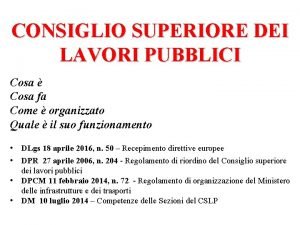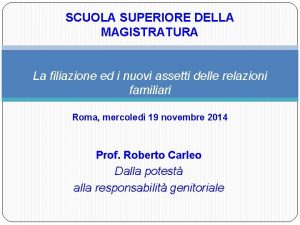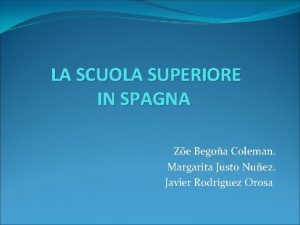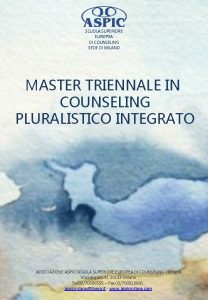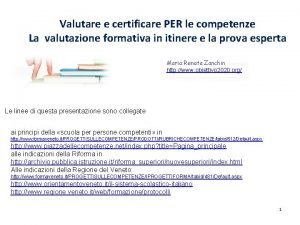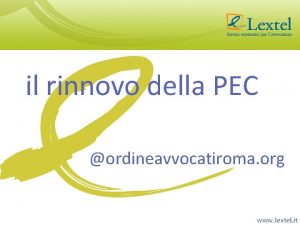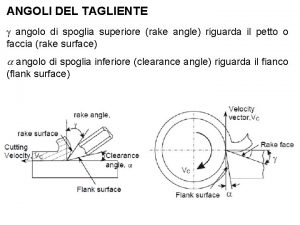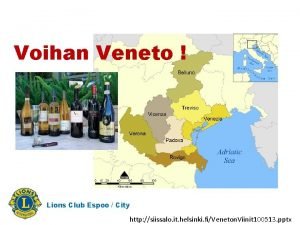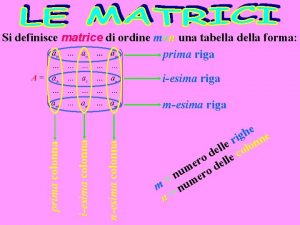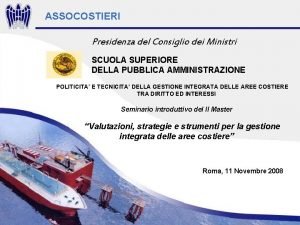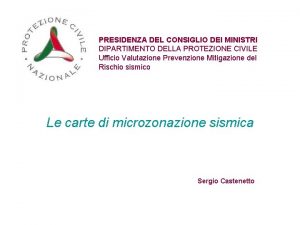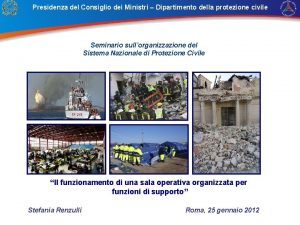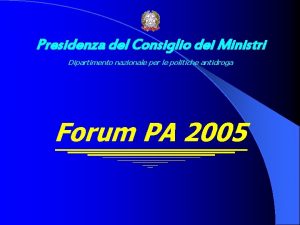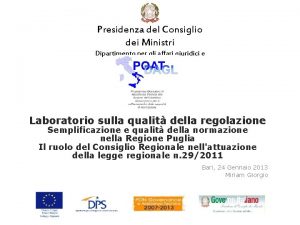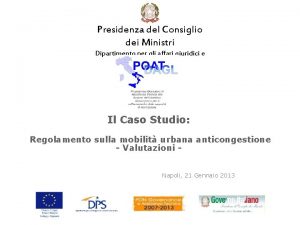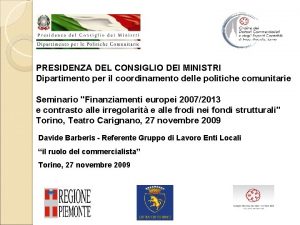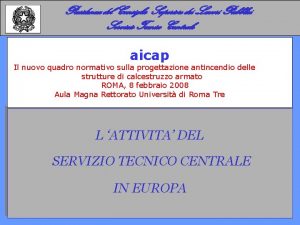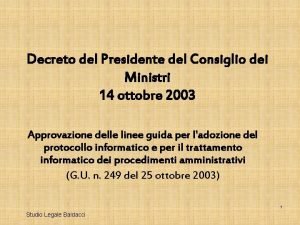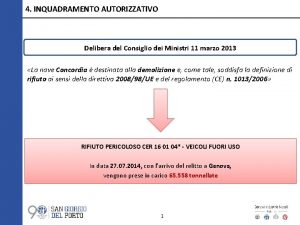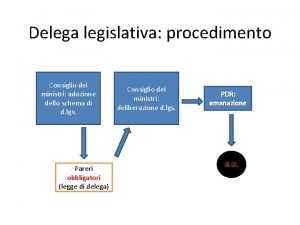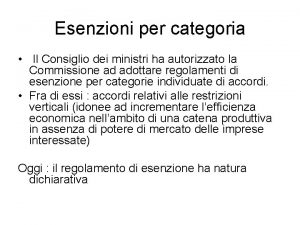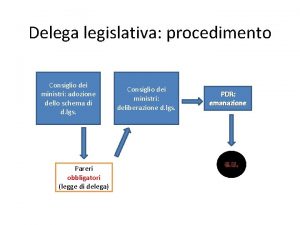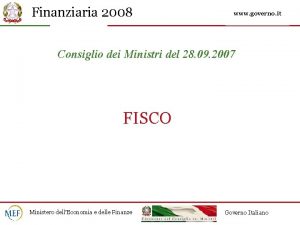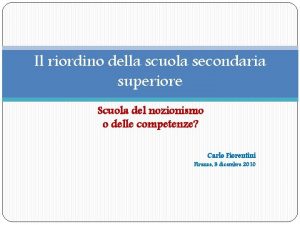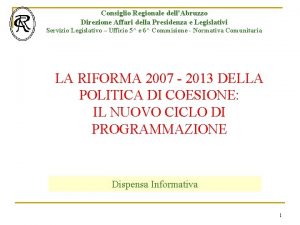Presidenza del Consiglio dei Ministri Scuola Superiore della

















- Slides: 17

Presidenza del Consiglio dei Ministri Scuola Superiore della Pubblica Amministrazione EMESCS The Euro-Mediterranean Senior Civil Servant Project

Project aims Fostering the set-up of a common administrative language Promoting a better understanding of relationships with the EU Enhancing mobility, networking and relationships Setting up a sustainable network of public managers having attended a common training and sharing a vision of growth in the Euro-Mediterranean area

Project aims EMESCS is a tool to provide Euro-Mediterranean civil servants with the basic background and knowledge necessary to undertake a mobility experience in another country of the area

Project aims Short-term objectives l Develop a scientific curriculum of the Euro-Mediterranean Senior Civil Servant Test a pilot training programme for senior civil servants of participant countries based on this scientific curriculum

Project promoters l The project is financed within the framework of an agreement between Dipartimento della Funzione Pubblica (Department of Public Administration) and SSPA - Scuola Superiore della Pubblica Amministrazione l Partner Schools can also be seen as promoters of the project towards their national Administrations, with a view to developing awareness and mobility initiatives in the public sector

Project promoters The project is developed within the activities of the Network of Schools and Institutes for Public Administration in the Euro-Mediterranean area (EMTPA)

Partners National Institute for Administration – Palestinian Authority Ecole nationale d’administration (ENA) – France Ecole nationale d’administration de Tunis (ENA) – Tunisia Ecole nationale d’administration (ENA) – Morocco European Centre for the Regions of EIPA - Spain Turkey and Middle-East Public Administration Institute (TODAIE) – Turkey Université Paris 1 Panthéon-Sorbonne – France

Partners Institute of Finance – Lebanon National Centre for Public Administration and Local Government (EKDDA) – Greece Regional Institute of Administration (IRA) of Bastia – France Scuola Superiore della Pubblica Amministrazione (SSPA) – Italy

Scientific Committee The Scientific Committee of the EMESCS Project was established upon invitation by SSPA and 11 partners from both sides of the Mediterranean welcomed the opportunity of working together on a common training programme. The Scientific Committee is responsible for examining and defining contents and methods for a common pilot course programme and for supervising the overall course organization, for selecting teaching staff among high-level lecturers and experts in the Euro-Mediterranean region.

Scientific Committee meetings – Acireale, Sicily, on 26 -27 May 2009 – Rome, 21 July 2009 – Rome, 28 October 2009

Target group The EMESCS pilot course will be addressed to Euro-Mediterranean Senior Civil Servants or people aspiring to managerial positions in public administration. It is intended, as a first instance, for central Public Administration middle-rank and young public managers of the Euro-Mediterranean area.

Training method The pilot course will include an e-learning period to be followed and validated by an in-class session The e-learning instrument is a crucial tool to deepen issues, read materials and statistics and self– evaluation of participants (through pre-assessment, intermediate and final tests) During the residential part (in-class), practical group exercises will enable to compare different experiences of a same topic

Training method l The training programme will both be based on general and country-specific modules based on local experiences l In-class sessions will be articulated in plenary sessions and parallel sessions, working groups (topic/country-specific groups) and feedback plenary sessions (to report on topic/country-specific groups)

Tentative training programme l Day 1 – EU framework and its impact on the Euro. Mediterranean region – – The Euro-Mediterranean partnership: up-to-date information Attitudes and behaviour Case study from North/South Topic/country-specific working groups (WG) sessions • ICT and e-government • Sustainable development • Water management • Migration • Diversity and citizenship

Tentative training programme l Day 2 – Institutional framework and governance systems in the Euro-Mediterranean region l Day 3 – Managerial tools and behaviour – – Human resources management Evaluation of public policies Leadership and competences Topic/country-specific working groups (WG) sessions • Innovation and creativity • Strategic planning and management

Tentative training programme l Day 4 – Managerial tools and behaviour – Principles of good governance: transparency, access, participation, accountability – Public / private partnership – Disaster management l Day 5 – Economics: facing the crisis – General aspects – Country-specific – Euro-Mediterranean economics

Tentative training programme l All Days will include – Plenary feedback session – WG Discussion and evaluation l Teaching and academic staff will be indicated by participating Schools and Institutions
 Consiglio superiore dei lavori pubblici
Consiglio superiore dei lavori pubblici Scuola superiore della magistratura
Scuola superiore della magistratura Riforma scuola superiore
Riforma scuola superiore Occhiello giornale
Occhiello giornale Scuola superiore spagna
Scuola superiore spagna Scuola superiore di counseling
Scuola superiore di counseling Rubriche di valutazione scuola primaria
Rubriche di valutazione scuola primaria Significato pelide
Significato pelide Lextel pec rinnovo
Lextel pec rinnovo Ezequiel consiglio
Ezequiel consiglio I diritti dei bambini testo
I diritti dei bambini testo Analisi di un testo narrativo
Analisi di un testo narrativo Paleolitico inferiore medio e superiore
Paleolitico inferiore medio e superiore Equazioni irrazionali
Equazioni irrazionali Angolo di spoglia superiore
Angolo di spoglia superiore Campolieti valpolicella ripasso 2010
Campolieti valpolicella ripasso 2010 Peduncolo cerebrale mesencefalo
Peduncolo cerebrale mesencefalo Matrice triangolare superiore
Matrice triangolare superiore
